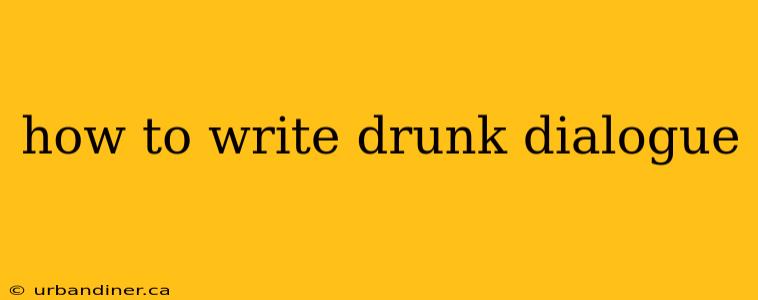Writing authentic drunk dialogue can add depth and realism to your characters and scenes. Whether in a novel, screenplay, or short story, portraying intoxicated speech effectively can evoke humor, sympathy, or a sense of chaos. In this article, we’ll explore various techniques to craft convincing drunk dialogue that resonates with your audience.
Understanding Drunk Speech
Before you start writing, it's essential to understand how alcohol affects speech. Drunk individuals often experience slurred words, altered emotions, and a mix of confidence and vulnerability. They may also:
- Speak louder or softer than usual
- Switch topics rapidly
- Repeat themselves
- Use exaggerated gestures
- Struggle with coherence
Key Techniques for Writing Drunk Dialogue
1. Use Slurred Speech
Drunk characters often slur their words. To convey this in writing, you can tweak spelling and punctuation:
- Example: "I’m ssssooo tired... can’t even think straight!"
2. Incorporate Repetition
Repeating phrases or words is common when someone is intoxicated. It adds to the character's state of inebriation:
- Example: "You know what? You know what? I love this place!"
3. Vary Sentence Lengths
Switching between long, rambling sentences and short, abrupt ones mimics the erratic nature of drunk conversation:
- Example: "I went to this... this amazing bar last night. And, oh my god, the drinks! So good. Like, the best... best I ever had!"
4. Create Emotional Fluctuations
Drunkenness often leads to unpredictable emotional swings. Show your character's changing emotions through dialogue:
- Example: "I’m so happy right now... sniff Why does everyone have to leave me?"
5. Include Non-Sequitors
Drunks can jump from topic to topic, reflecting their scattered thoughts:
- Example: "I can’t believe the weather! Did you see that dog? Dogs are awesome. I used to have a dog…"
Adding Humor
Drunk dialogue can also be humorous. Utilize absurdity and exaggerated scenarios to inject comedy:
- Example: "I’m tellin’ you, if I were a superhero, I’d be... I’d be Captain Pizza! The savior of hungry people everywhere!"
Real-Life Inspiration
To make your writing authentic, observe real-life drunken interactions. Pay attention to how friends and acquaintances behave in bars or parties.
Conclusion
Writing drunk dialogue can be both fun and challenging. By employing techniques like slurred speech, repetition, emotional fluctuations, and incorporating non-sequitors, you can create dialogue that is believable and entertaining.
Get Feedback
Lastly, don’t hesitate to share your drafts with friends or fellow writers. Getting feedback can help you refine your portrayal of drunken characters.
By mastering these techniques, you'll be able to create engaging and humorous dialogues that resonate with your readers. Happy writing!
